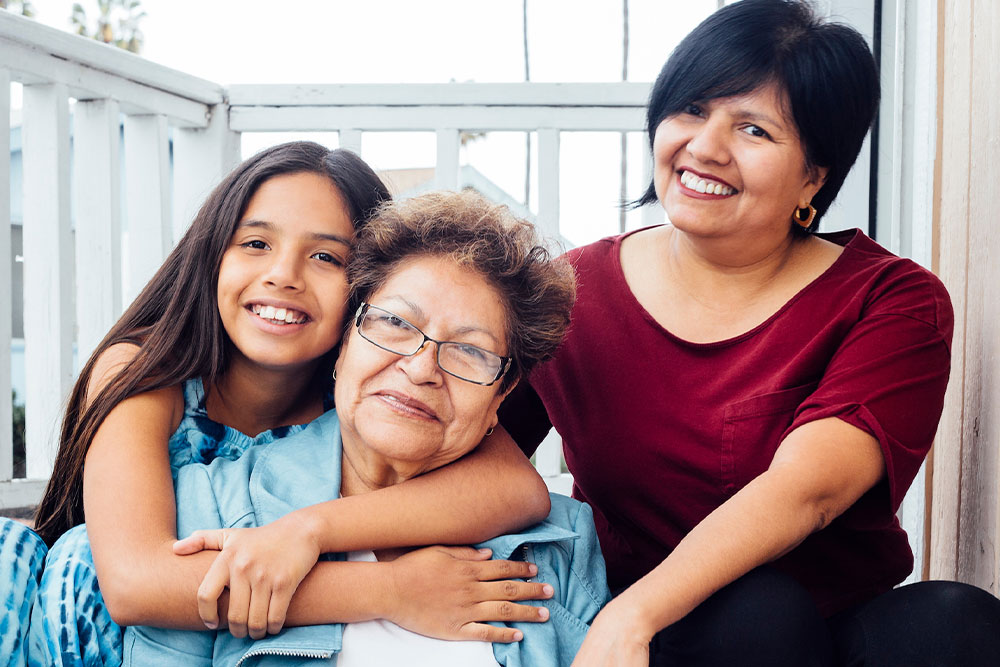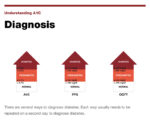


American Diabetes Association
Over 133 million Americans have diabetes and prediabetes. And with a diabetes diagnosis comes a host of other complications, from the kidneys and feet to the brain and skin. Not to mention the mental and financial strain that comes from years of systemic health inequity. It contributes to worse outcomes and higher risk for diabetes and many other diseases. And it undermines the wellbeing of our most underserved communities. Inaction is no longer an option, we need Health Equity Now®.
Our mission? To prevent and cure diabetes and to improve the lives of all people affected by diabetes.
The moving force behind the work of the ADA is a network of more than 565,000 volunteers, their families and caregivers; a professional society of nearly 12,000 health care professionals; as well as more than 250 staff members. For 83 years, the ADA has driven discovery and research to treat, manage, and prevent diabetes while working relentlessly for a cure. The ADA is the nation’s leading voluntary health organization fighting to bend the curve on the diabetes epidemic through advocacy, program development, and education to help people living with diabetes thrive.
Diabetes Resources
If you have been diagnosed with diabetes or if you have a loved one with this condition, please review these resources from the American Diabetes Association.
How do I know if I have diabetes?
The only way to know if you have diabetes is through a blood test administered by your health care provider—but these resources can give you an idea of your risk for type 2 and help you understand the diagnosis process.
- Take our 60-Second Type 2 Diabetes Risk Test. (online test)
 Use this online test to determine if you or your loved one are at risk for developing diabetes.
Use this online test to determine if you or your loved one are at risk for developing diabetes. - Get the tools to know your risk. (online tools)
 By starting with these tools, you can figure out which next steps are best for you. Whether it’s losing a few pounds, adding some physical activity to your day or making healthier food choices, we can help you reach your goals.
By starting with these tools, you can figure out which next steps are best for you. Whether it’s losing a few pounds, adding some physical activity to your day or making healthier food choices, we can help you reach your goals. - Learn how diabetes is diagnosed. (website)
 There are several ways to diagnose diabetes. Each way usually needs to be repeated on a second day to diagnose diabetes. Learn more.
There are several ways to diagnose diabetes. Each way usually needs to be repeated on a second day to diagnose diabetes. Learn more.
How can I lower my risk for diabetes?
There are many lifestyle changes you can make to lower your risk for type 2 diabetes.
- Learn what steps you can take to prevent prediabetes from becoming diabetes. (website)
 If you’ve been diagnosed with prediabetes, we know that can feel like a lot—like your life has changed and you’ll never be “normal” again. But know that that isn’t the case.
If you’ve been diagnosed with prediabetes, we know that can feel like a lot—like your life has changed and you’ll never be “normal” again. But know that that isn’t the case. - Get smart about risks and diabetes prevention. (website)
 With early detection and awareness, you can take steps to prevent or delay the onset of type 2 diabetes.
With early detection and awareness, you can take steps to prevent or delay the onset of type 2 diabetes. - Find a CDC-recognized program that can cut your risk of developing type 2 in half.
 As part of our commitment to reduce the incidence of diabetes, we are working with the Centers for Disease Control and Prevention (CDC)’s National Diabetes Prevention Program (National DPP) to implement one key feature of the National DPP—a research-based, structured lifestyle change program that is proven to help prevent and delay the development of type 2 diabetes.
As part of our commitment to reduce the incidence of diabetes, we are working with the Centers for Disease Control and Prevention (CDC)’s National Diabetes Prevention Program (National DPP) to implement one key feature of the National DPP—a research-based, structured lifestyle change program that is proven to help prevent and delay the development of type 2 diabetes. - Register for Project Power, a no-cost lifestyle change program.
 The American Diabetes Association’s Project Power is an initiative with the aim to help adults and youth raise diabetes awareness and offer diabetes risk reduction education.
The American Diabetes Association’s Project Power is an initiative with the aim to help adults and youth raise diabetes awareness and offer diabetes risk reduction education.
I want to learn more about diabetes.
You can trust these resources to provide scientifically backed, ADA-approved information on every type of diabetes.
- Diabetes Overview (website)
 Whether you’ve been newly diagnosed, have been fighting against type 1 or type 2 diabetes for a while, or are helping a loved one, you’ve come to the right place. This is the start of gaining a deeper understanding of how you can live a healthier life—with all the tools, health tips, and food ideas you need.
Whether you’ve been newly diagnosed, have been fighting against type 1 or type 2 diabetes for a while, or are helping a loved one, you’ve come to the right place. This is the start of gaining a deeper understanding of how you can live a healthier life—with all the tools, health tips, and food ideas you need. - Prediabetes Overview (website)
 For some people with prediabetes, early treatment as well as moderate lifestyle changes can actually return blood glucose (blood sugar) levels to a normal range, effectively preventing or delaying type 2 diabetes.
For some people with prediabetes, early treatment as well as moderate lifestyle changes can actually return blood glucose (blood sugar) levels to a normal range, effectively preventing or delaying type 2 diabetes. - Type 1 Diabetes Overview (website)
 With the right tools and support, you can do anything. Whether you’ve been newly diagnosed with type 1 diabetes, are helping a loved one, or have been managing your condition for a while, help is here.
With the right tools and support, you can do anything. Whether you’ve been newly diagnosed with type 1 diabetes, are helping a loved one, or have been managing your condition for a while, help is here. - Type 2 Diabetes Overview (website)
 Maybe you’ve just been diagnosed with type 2 diabetes. Or maybe you’ve been living with it for a while. Here’s the thing: your journey is unique and it starts fresh every day.
Maybe you’ve just been diagnosed with type 2 diabetes. Or maybe you’ve been living with it for a while. Here’s the thing: your journey is unique and it starts fresh every day. - Gestational Diabetes Overview (website)
 Gestational diabetes and a healthy baby? Yes. It can be a scary diagnosis, but it’s one that’s fairly common. And know that it doesn’t mean that you had diabetes before you conceived or that you will have diabetes after you give birth. It means that, by working with your doctor, you can have a healthy pregnancy and a healthy baby. No matter what, you have all the support you need for both you and your baby.
Gestational diabetes and a healthy baby? Yes. It can be a scary diagnosis, but it’s one that’s fairly common. And know that it doesn’t mean that you had diabetes before you conceived or that you will have diabetes after you give birth. It means that, by working with your doctor, you can have a healthy pregnancy and a healthy baby. No matter what, you have all the support you need for both you and your baby.
I’ve been diagnosed with diabetes. What’s next?
A diabetes diagnosis can be overwhelming, but there are steps you can take to manage your diabetes well and live a long, healthy life. Your best days are ahead of you.
- Get tips for the newly diagnosed. (website)
 1.5 million people will be diagnosed with diabetes this year. We make sure that’s not the end of the story.
1.5 million people will be diagnosed with diabetes this year. We make sure that’s not the end of the story.
How do I live well with diabetes?
A diabetes diagnosis doesn’t have to stop you from living a healthy life. The ADA is here for you with the resources you need to stay on top of nutrition, fitness, and so much more.
- Nutrition: Tips for Eating Well (website)
 Eating right doesn’t have to be boring. When it comes to nutrition and diabetes, it’s all about finding the right balance that works for you.
Eating right doesn’t have to be boring. When it comes to nutrition and diabetes, it’s all about finding the right balance that works for you. - Fitness: Tips for How to Get Moving (website)
 Whether you’re just getting started or are an experienced athlete, regular physical activity is an important part of diabetes management.
Whether you’re just getting started or are an experienced athlete, regular physical activity is an important part of diabetes management. - Weight Loss: Tips to Lose Weight for Good (website)
 When you have diabetes, being overweight brings added risks. Find the best strategy to keep extra weight off and stay healthy.
When you have diabetes, being overweight brings added risks. Find the best strategy to keep extra weight off and stay healthy. - Mental Health: Tips for Prioritizing Your Mental Health (website)
 Diabetes takes a toll on more than your body. It’s normal to feel emotional strain — and it’s important to ask for help.
Diabetes takes a toll on more than your body. It’s normal to feel emotional strain — and it’s important to ask for help. - Medications & Treatments (website)
 Get a handle on diabetes medications and treatments. The more you know, the better you’ll feel.
Get a handle on diabetes medications and treatments. The more you know, the better you’ll feel. - Device Technology (website)
 From blood glucose meters and continuous glucose monitoring (CGM) to cutting-edge insulin pumps and more, devices are easier to use and less invasive. There are lots of options so that you can find what works best for you.
From blood glucose meters and continuous glucose monitoring (CGM) to cutting-edge insulin pumps and more, devices are easier to use and less invasive. There are lots of options so that you can find what works best for you. - Healthy Living (website)
 Find everything you need for healthy living right here.
Find everything you need for healthy living right here. - Diabetes Food Hub (website)
 Discover free diabetes-friendly recipes for every course, plus meal planning and grocery shopping tools. (Available in English and Spanish)
Discover free diabetes-friendly recipes for every course, plus meal planning and grocery shopping tools. (Available in English and Spanish) - Consumer Guide (website)
 Whatever your diabetes device or medication needs, ADA’s Consumer Guide can help.
Whatever your diabetes device or medication needs, ADA’s Consumer Guide can help.
I’m a loved one or caregiver for someone with diabetes. How can I support them?
There are countless ways to help your loved ones live a healthy, happy life. We have the resources to help.
- Access our guide for loved ones and caregivers of someone with diabetes. (website)
 Managing diabetes is an uphill climb. Giving support to those you love can make all the difference.
Managing diabetes is an uphill climb. Giving support to those you love can make all the difference. - Know your rights; keep your children with diabetes Safe at School®. (website)
 Our Safe at School campaign works to make sure the diabetes management needs of children are met so they are healthy and safe and able to enjoy the same opportunities as their peers. Learn more about legal protections, written care plans, training, help for schools, and more.
Our Safe at School campaign works to make sure the diabetes management needs of children are met so they are healthy and safe and able to enjoy the same opportunities as their peers. Learn more about legal protections, written care plans, training, help for schools, and more. - Get answers to your questions with our Ask the Experts free Q&A webinars. (live webinars recordings of previous events)
 Our Ask the Experts series is designed to help people with diabetes tackle commonly faced issues by providing a community where individuals can ask questions of our experts and hear from others who might share similar experiences.
Our Ask the Experts series is designed to help people with diabetes tackle commonly faced issues by providing a community where individuals can ask questions of our experts and hear from others who might share similar experiences.
Do you have resources in Spanish?
If Spanish is your primary language or the primary language of someone you know with diabetes, these resources were made for you.
- Recursos en español (biblioteca de recursos)
 Vivir con diabetes no es fácil. Podemos ayudarte. Para mantenerte lo más sano posible, es importante conocer los síntomas frecuentes de la diabetes y las complicaciones relacionadas con ella.
Vivir con diabetes no es fácil. Podemos ayudarte. Para mantenerte lo más sano posible, es importante conocer los síntomas frecuentes de la diabetes y las complicaciones relacionadas con ella.
How can diabetes affect other parts of my body?
Diabetes doesn’t just affect your blood glucose (blood sugar) levels; it affects almost every part of your body.
- How Diabetes Affects Your Eyes (website)
 It’s easy to take your eyesight for granted. Diabetes is the leading cause of vision loss in people 18–64 years old. And there are no obvious signs or symptoms. But the great news is an annual routine eye exam could prevent 95% of vision loss caused by diabetes.
It’s easy to take your eyesight for granted. Diabetes is the leading cause of vision loss in people 18–64 years old. And there are no obvious signs or symptoms. But the great news is an annual routine eye exam could prevent 95% of vision loss caused by diabetes. - How Diabetes Affects Your Feet (website)
 The connection between diabetes and your feet is important because diabetes can cause nerve damage and reduced circulation, ultimately leading to limb loss and other complications. The good news is you can lower your chances of complications by managing your blood glucose levels and taking care of your feet.
The connection between diabetes and your feet is important because diabetes can cause nerve damage and reduced circulation, ultimately leading to limb loss and other complications. The good news is you can lower your chances of complications by managing your blood glucose levels and taking care of your feet. - How Diabetes Affects Your Heart (website & eLearning course)
 Learn more about the relationship between diabetes, heart disease and stroke.
Learn more about the relationship between diabetes, heart disease and stroke. - How Diabetes Affects Your Kidneys (website)
 Anyone with diabetes can take steps to prevent chronic kidney disease (CKD), and those who already have CKD can try and slow the process. Early detection, managing blood glucose (blood sugar) levels and blood pressure, living a healthy lifestyle, and health education can help prevent or delay CKD from progressing.
Anyone with diabetes can take steps to prevent chronic kidney disease (CKD), and those who already have CKD can try and slow the process. Early detection, managing blood glucose (blood sugar) levels and blood pressure, living a healthy lifestyle, and health education can help prevent or delay CKD from progressing. - How Diabetes Affects Your Hearing (website)
 If you live with diabetes, you are twice as likely to experience hearing loss. Learn the early signs and what action you should take.
If you live with diabetes, you are twice as likely to experience hearing loss. Learn the early signs and what action you should take. - How Diabetes Affects Your Blood Pressure (website)
 Two of three people with diabetes report having high blood pressure or take prescription medications to lower their blood pressure.
Two of three people with diabetes report having high blood pressure or take prescription medications to lower their blood pressure. - How Diabetes Affects Your Nerves (website)
 Nerve damage from diabetes is called “diabetic neuropathy,” affecting about half of all people with diabetes.
Nerve damage from diabetes is called “diabetic neuropathy,” affecting about half of all people with diabetes. - How Diabetes Affects Your Brain (website)
 If you have diabetes, your chances of having a stroke are 1.5 times higher than in people who don’t have diabetes. Learn how to lower your risk.
If you have diabetes, your chances of having a stroke are 1.5 times higher than in people who don’t have diabetes. Learn how to lower your risk. - How Diabetes Affects Your Skin (website)
 Diabetes can affect every part of the body, including the skin. In fact, skin problems are sometimes the first sign that a person has diabetes.
Diabetes can affect every part of the body, including the skin. In fact, skin problems are sometimes the first sign that a person has diabetes.

“It’s imperative that we raise awareness about long-standing health inequities and address them to improve health outcomes, including lowering the risk of diabetes.”
Charles “Chuck” Henderson,
CEO, American Diabetes Association